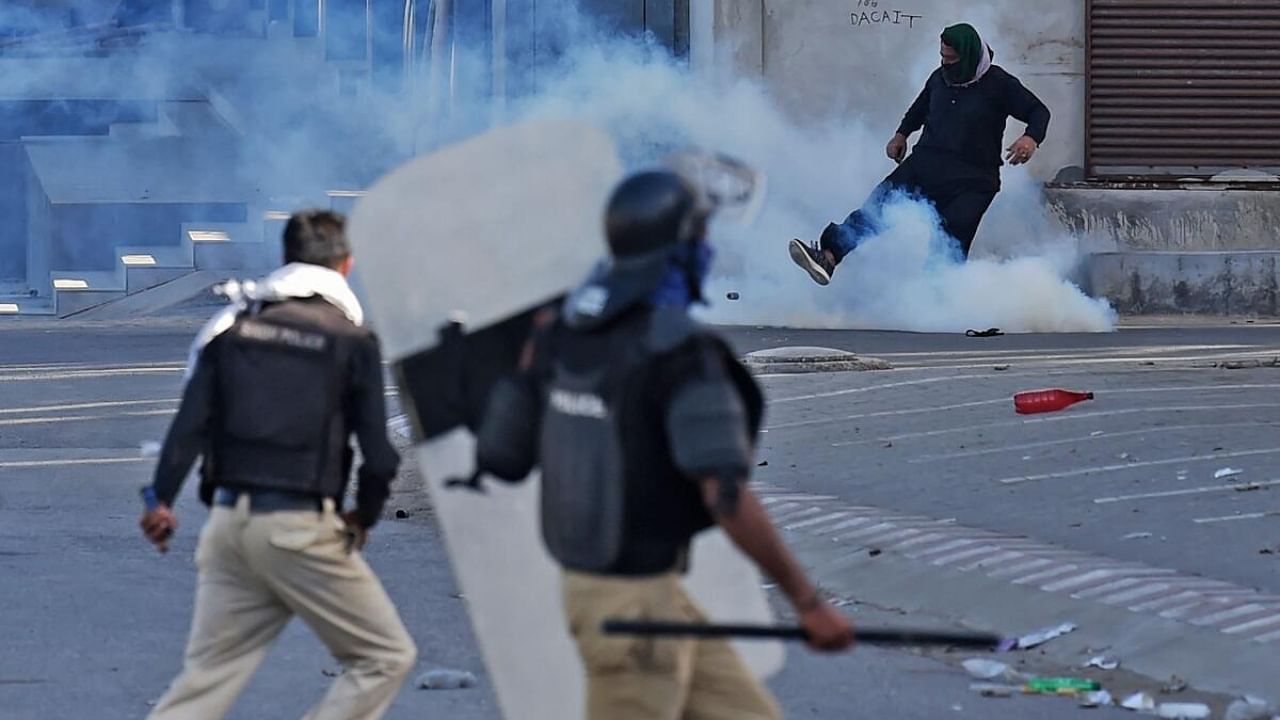
Pakistan has plunged into political turmoil with the arrest of former Prime Minister and Pakistan Tehreek-i-Insaaf (PTI) chief Imran Khan.
The clash of interests between Imran Khan and the country’s army arose because he wanted elections to be held in Punjab on May 14 as per the Supreme Court of Pakistan’s ruling but the army and the incumbent Shahbaz Sharif regime wanted to defer the polls to later in the year. The key to capturing political power at the centre is political victory in Punjab first, and hence the army’s reluctance to hold elections in the province. The dramatic rise in Imran’s popularity, particularly in urban and middle-class households across the country, has alarmed the army and it sought to curtail his ability to mobilise the masses.
The PTI, or Movement for Justice, emerged as the largest party in Parliament in the 2018 general elections, enabling it to lead a coalition government. It was a remarkable victory for a party with only one provincial electoral success – in Khyber Pakhtunkhwa -- prior to 2013. Imran Khan promised a naya (new) Pakistan and a new style of politics in a country that had long been burdened with dynastic and corrupt civilian leaders from the Pakistan People’s Party (PPP) and the Pakistan Muslim League-Nawaz (PML-N).
Today, there is greater youth activism in Pakistani politics, which explains the unprecedented levels of street-power visible across the major cities of Lahore, Karachi, Islamabad and Peshawar to challenge the power of the State manifested through the army. Imran benefitted from and promoted the anti-military narrative – that the army interferes in the country’s political affairs -- that former Prime Minister Nawaz Sharif first crafted, and it has captured the imagination of a significant number of Pakistanis, especially its youth.
If youth activism translates into votes at the ballot boxes, it could be a game-changer, determining the outcome of the next election and perhaps propelling Imran Khan and his PTI into office again. Also, technology has created a more informed and connected citizenry, while social media is a new factor shaping the political environment in Pakistan. While the electronic media is subject to State controls, the social media is much harder to control.
So, the government has now disabled social media.
The fact that PTI supporters attempted to storm the army’s General Headquarters (GHQ) in the garrison town of Rawalpindi, Punjab, is a serious development, with far-reaching consequences for Pakistan. The GHQ, the Pakistan Army’s sanctum sanctorum, has never before been vulnerable to political violence. Considering that the Pakistan Army is the self-appointed custodian of Pakistan’s national interest, it has emerged as a pre-eminent national institution that has for long been the final arbiter on who holds civilian political power. Should the army itself become the target of people’s anger, can the State structure remain intact?
There’s the added complication of divisions within the army this time. The rift among the Generals is because some of them believe that peace with the TTP (Pakistan Taliban) is best for national security, while others think that developing harmonious ties with India would be a better bet. The pro-Imran Khan faction of the army leadership prefers the TTP option and is therefore against army chief Gen Asim Munir, who supports Nawaz Sharif’s peace bid with India. The army dislikes the Sharif and Zardari political families, against whom it has promoted propaganda over their corruption, which the citizenry has subscribed to seriously. Therefore, Gen. Munir’s pro-Nawaz line is despised at GHQ.
The lawyers’ agitation against the late Gen. Pervez Musharraf in 2007 helped to end his military rule and pave the path for elections in 2008. Thus began a phase of confrontation between the political leadership and the army in the country, which was a transition from the period of co-existence between the two, until the death of former President Gen Zia ul Haq in August 1988 in an aircrash. For GHQ, Imran’s phenomenal potential to be voted to power is reminiscent of the late Benazir Bhutto’s ascension to prime ministership in the post-Zia period. In the post-Musharaff phase, the military lost its pre-eminence and realised that it had lost popularity, too.
No wonder that in October 2022, then Pakistan Army Chief Gen. Javed Qamar Bajwa proclaimed, while on an official visit to Washington DC, that the army would no longer intervene in Pakistan’s politics. It is believed that Bajwa desired to build good relations with India but Imran opposed the move saying that it would nullify the sacrifices of Kashmiris. The Dawn newspaper leaks of 2014 were also about Nawaz Sharif’s articulation for cordial ties with India, which the army was then opposed to.
Pakistan’s political journey over 75 years of nationhood has alternated between civilian and military rule. The country’s powerful military establishment has never allowed a democratically elected government to complete its full term in office; therefore, the nature of civil-military relations is the defining feature of Pakistan’s political landscape. The banning of political parties, the introduction of presidential forms of government, the dismissal of democratically-elected leaders through the use of dubious constitutional amendments, and the suppression of alternative, radical forms of politics, are all routine features of military politics that have systematically undermined democracy in Pakistan.
The absence of democracy has led to the ongoing political protests in Pakistan, which amounts to a strategic inflection point in the country’s troubled political journey, along with a bankrupt economy. Over the last couple of decades, the Pakistani middle-class has begun to think, if the rest of South Asia is ready for democracy why cannot they also enjoy a democratic political system. At this critical juncture, whether or not the power of the judiciary would prevail over that of the all-powerful army remains to be seen. That will determine the political future of the 230 million people of Pakistan.
(The writer is Member Secretary, Institute of Contemporary Studies, Bengaluru and specialises in Pakistan Studies)